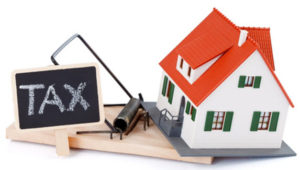 Each year I find myself having to explain to Texans that in general, across a taxing district average higher property value appraisals do not raise your property taxes; that is done solely by the votes of local government officials when they set a new property tax rate for their upcoming budget year.
Each year I find myself having to explain to Texans that in general, across a taxing district average higher property value appraisals do not raise your property taxes; that is done solely by the votes of local government officials when they set a new property tax rate for their upcoming budget year.
Maybe one of the reasons local officials, along with cooperative or ignorant local media, find it so easy to mislead voters into thinking they, the local politicians, are not directly and solely responsible for raising property taxes is that much of the public thinks the State of Texas levies those taxes.
A May 2022 UT Tyler and Dallas Morning News poll asked Texans: “Who do you believe is responsible for high property taxes in Texas?” The answers were astonishing.
The largest cohort of those polled said “Governor Abbott and Texas legislators” are responsible – 40% of all respondents blamed the state government even though the State of Texas does not levy any property tax!
According to the poll, 60% of Democrats blamed the governor and state legislators; 34% of independents did the same, and; even 26% of Republicans blamed those who do not levy, set a tax rate for, or collect a property tax for “high property taxes in Texas!”
 No wonder local elected officials who run cities, counties, school districts, and special districts local voters have created, get away with claiming they are not raising property taxes when so many people wrongly think such is done by legislators in Austin.
No wonder local elected officials who run cities, counties, school districts, and special districts local voters have created, get away with claiming they are not raising property taxes when so many people wrongly think such is done by legislators in Austin.
Whether you call it the Effective Tax Rate or the No New Revenue Tax Rate, Texans must remember that, in aggregate across a taxing district (school, city, county, etc.) higher property value appraisals do not raise property taxes; tax increases are made solely by local government officials when they set a new tax rate each summer for their coming fiscal year.
Each year after new appraised values are set, each local government which levies a property tax must calculate and publish the No New Revenue tax rate. That figure, which reflects appraisal changes, keeps their tax money take equal to the previous year’s take, in aggregate, over their taxing district from existing properties taxed in the previous year.
Last year’s tax rate, so often talked about in the context of raising or lowering it, is meaningless. For example, if your city’s appraised values on pre-existing property increased an average of five percent, the No New Revenue, or Effective tax rate is lowered by about that amount to produce the same revenue from those same properties as was billed the year before.
When officials say they kept the “tax rate the same” as the year before, if there was an increase in appraised values then it means they chose to raise your taxes. Understand that the previous year’s rate has no meaning in determining whether officials voted to increase or lower property taxes. The base numbers are completely reset each year after the annual round of appraisals.
Don’t be fooled. And, don’t be so ignorant as to think legislators and the state’s governor are directly responsible for your property taxes. Those taxes are levied solely at the local level with a new, fresh rate set each year by local elected officials who increase taxes when they decide they want more money from existing taxpayers than they took the previous year.
Only local votes to adopt the No New Revenue tax rate, or one lower, is voting for no tax increase and those decisions are made by the elected officials running your various local governments – not legislators in Austin.
You can see a collection of essays on how Texas property taxes work, as well as how often local official outright lie about such, here: https://prattontexas.com/category/commentary/property-tax/





















Since the majority of our property taxes are for the m/o rate for schools. Go to theTEA website. Search m/o rate. Locate the Maximum and minimum compression rate for schools set by the state. Read that and see if the state has any control.
Don, there is no question that the school funding formula is different from other local governments however the point of the column is still entirely true for school districts: Tax increases are a function of the local board passing such.
The legislature has done nothing over the past decade but hand more state collected tax money to school districts in return for districts lowering local property taxes (compression.) The state formula for schools is a complicated see-saw system in which the fewer local property taxes collected, the more state dollars that flow to that school district. Certainly there are minimum requirements as otherwise districts simply abuse the system of local funding by under-appraising property or setting local tax rates so low that they pull more dollars from outside taxpayers into their district through state coffers. That is unique to schools but again, tax increases are votes of local school boards and not caused by general appraised value increases.
All property tax law is state in nature with all parameters defined by state law but the levying of those taxes is set locally. For example, the state does not make districts pass bond issues that result in higher taxes to pay off the debt no more than it requires local cities to build new parks and raise taxes to pay for such.
Robert, The school funding is a complicated issue. The State has dropped funding to schools from 52% to 37% (around those numbers). But, as stated in the TEA website under m/o rates “NO district will have a maximum tier one rate lower than 0 .8046. for ty 2022-23. That is mandated by the state and if a district goes lower the state decreases funding to the district. My point is that the state does have control on the schools.
The state also sets the appraised price for a barrell of oil. Add a nickel to this, whatever the amount and apply that to public education. Just a thought. Enjoy your program but I haave to disagree with you on the no control by the state (for schools). Tell my college teammate Mark Miller hello for me. Great guy.
I never said the state has “no control” over property taxes. What I said is that local official set the tax rate at, below, or above the No New Revenue Rate. The minimum rate for school districts is just that, a minimum rate. It does not force district boards to raise the property tax rate which they do often. Again, the school finance formula provides more state money to districts that have a lesser local property tax base and less state collected money to those with more – that is a result of several court decisions requiring a form of “equity.”
The only voice Texas property owners have with regard to property taxes is from the top down. The
Texas Legislature sets the guidelines for property taxes statewide and the recent referendum during
the Primary reflected property owners overwhelming desire to keep property taxes low and to
remove them completely in the future. Any entity that can levy at tax on your property renders
title to that property null and void because the property owner can never actually own the property
without paying a yearly extortion fee to those taxing entities. That was NOT how the founders of
Texas wanted Texas to progress as a nation. Keep it FREE was their motto and levying taxes is NOT
keeping it FREE.
[email protected]
The Hospital Districts, emergency services districts, the water districts, the city managers, and the County Commissioners all have
it set up so the property owners have little to NO audience with them and hence no say in property
tax levels. In Reeves county we had to get rid of the Appraisal District Manager for CORRUPTION and
misappropriation of funds. This is NOT an isolated incident in Texas.
[email protected]
Right. The public must show up and participate. Local media coverage is often non-existent or factually wrong about such and local advertisers should insist it be otherwise.
Certainly from an overall policy perspective you are right. But that is not the point of the column which is as it works now, local officials raise and lower property taxes not legislators.